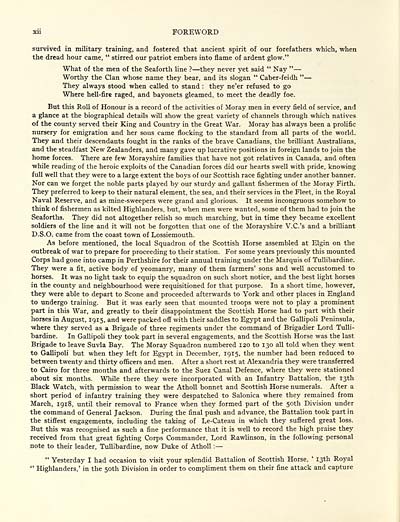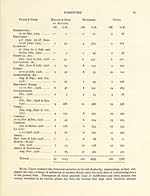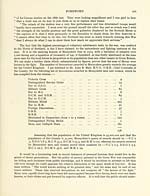Places > Morayshire roll of honour
(16) Page xii
Download files
Complete book:
Individual page:
Thumbnail gallery: Grid view | List view

xii FOREWORD
survived in military training, and fostered that ancient spirit of our forefathers which, when
the dread hour came, " stirred our patriot embers into flame of ardent glow."
What of the men of the Seaforth line ? — they never yet said " Nay " —
Worthy the Clan whose name they bear, and its slogan " Caber-feidh " —
They always stood when called to stand : they ne'er refused to go
Where hell-fire raged, and bayonets gleamed, to meet the deadly foe.
But this Roll of Honour is a record of the activities of Moray men in every field of service, and
a glance at the biographical details will show the great variety of channels through which natives
of the county served their King and Country in the Great War. Moray has always been a prolific
nursery for emigration and her sons came flocking to the standard from all parts of the world.
They and their descendants fought in the ranks of the brave Canadians, the brilliant Australians,
and the steadfast New Zealanders, and many gave up lucrative positions in foreign lands to join the
home forces. There are few Morayshire families that have not got relatives in Canada, and often
while reading of the heroic exploits of the Canadian forces did our hearts swell with pride, knowing
full well that they were to a large extent the boys of our Scottish race fighting under another banner.
Nor can we forget the noble parts played by our sturdy and gallant fishermen of the Moray Firth.
They preferred to keep to their natural element, the sea, and their services in the Fleet, in the Royal
Naval Reserve, and as mine-sweepers were grand and glorious. It seems incongruous somehow to
think of fishermen as kilted Highlanders, but, when men were wanted, some of them had to join the
Seaforths. They did not altogether relish so much marching, but in time they became excellent
soldiers of the line and it will not be forgotten that one of the Morayshire V.C.'s and a brilliant
D.S.O. came from the coast town of Lossiemouth.
As before mentioned, the local Squadron of the Scottish Horse assembled at Elgin on the
outbreak of war to prepare for proceeding to their station. For some years previously this mounted
Corps had gone into camp in Perthshire for their annual training under the Marquis of Tullibardine.
They were a fit, active body of yeomanry, many of them farmers' sons and well accustomed to
horses. It was no light task to equip the squadron on such short notice, and the best light horses
in the county and neighbourhood were requisitioned for that purpose. In a short time, however,
they were able to depart to Scone and proceeded afterwards to York and other places in England
to undergo training. But it was early seen that mounted troops were not to play a prominent
part in this War, and greatly to their disappointment the Scottish Horse had to part with their
horses in August, 1915, and were packed off with their saddles to Egypt and the Gallipoli Peninsula,
where they served as a Brigade of three regiments under the command of Brigadier Lord Tulli-
bardine. In Gallipoli they took part in several engagements, and the Scottish Horse was the last
Brigade to leave Suvla Bay. The Moray Squadron numbered 120 to 130 all told when they went
to Gallipoli but when they left for Egypt in December, 1915, the number had been reduced to
between twenty and thirty officers and men. After a short rest at Alexandria they were transferred
to Cairo for three months and afterwards to the Suez Canal Defence, where they were stationed
about six months. While there they were incorporated with an Infantry Battalion, the 13th
Black Watch, with permission to wear the Atholl bonnet and Scottish Horse numerals. After a
short period of infantry training they were despatched to Salonica where they remained from
March, 1918, until their removal to France when they formed part of the 50th Division under
the command of General Jackson. During the final push and advance, the Battalion took part in
the stiffest engagements, including the taking of Le-Cateau in which they suffered great loss.
But this was recognised as such a fine performance that it is well to record the high praise they
xeceived from that great fighting Corps Commander, Lord Rawlinson, in the following personal
note to their leader, Tullibardine, now Duke of Atholl : —
" Yesterday I had occasion to visit your splendid Battalion of Scottish Horse, ' 13th Royal
*' Highlanders,' in the 50th Division in order to compliment them on their fine attack and capture
survived in military training, and fostered that ancient spirit of our forefathers which, when
the dread hour came, " stirred our patriot embers into flame of ardent glow."
What of the men of the Seaforth line ? — they never yet said " Nay " —
Worthy the Clan whose name they bear, and its slogan " Caber-feidh " —
They always stood when called to stand : they ne'er refused to go
Where hell-fire raged, and bayonets gleamed, to meet the deadly foe.
But this Roll of Honour is a record of the activities of Moray men in every field of service, and
a glance at the biographical details will show the great variety of channels through which natives
of the county served their King and Country in the Great War. Moray has always been a prolific
nursery for emigration and her sons came flocking to the standard from all parts of the world.
They and their descendants fought in the ranks of the brave Canadians, the brilliant Australians,
and the steadfast New Zealanders, and many gave up lucrative positions in foreign lands to join the
home forces. There are few Morayshire families that have not got relatives in Canada, and often
while reading of the heroic exploits of the Canadian forces did our hearts swell with pride, knowing
full well that they were to a large extent the boys of our Scottish race fighting under another banner.
Nor can we forget the noble parts played by our sturdy and gallant fishermen of the Moray Firth.
They preferred to keep to their natural element, the sea, and their services in the Fleet, in the Royal
Naval Reserve, and as mine-sweepers were grand and glorious. It seems incongruous somehow to
think of fishermen as kilted Highlanders, but, when men were wanted, some of them had to join the
Seaforths. They did not altogether relish so much marching, but in time they became excellent
soldiers of the line and it will not be forgotten that one of the Morayshire V.C.'s and a brilliant
D.S.O. came from the coast town of Lossiemouth.
As before mentioned, the local Squadron of the Scottish Horse assembled at Elgin on the
outbreak of war to prepare for proceeding to their station. For some years previously this mounted
Corps had gone into camp in Perthshire for their annual training under the Marquis of Tullibardine.
They were a fit, active body of yeomanry, many of them farmers' sons and well accustomed to
horses. It was no light task to equip the squadron on such short notice, and the best light horses
in the county and neighbourhood were requisitioned for that purpose. In a short time, however,
they were able to depart to Scone and proceeded afterwards to York and other places in England
to undergo training. But it was early seen that mounted troops were not to play a prominent
part in this War, and greatly to their disappointment the Scottish Horse had to part with their
horses in August, 1915, and were packed off with their saddles to Egypt and the Gallipoli Peninsula,
where they served as a Brigade of three regiments under the command of Brigadier Lord Tulli-
bardine. In Gallipoli they took part in several engagements, and the Scottish Horse was the last
Brigade to leave Suvla Bay. The Moray Squadron numbered 120 to 130 all told when they went
to Gallipoli but when they left for Egypt in December, 1915, the number had been reduced to
between twenty and thirty officers and men. After a short rest at Alexandria they were transferred
to Cairo for three months and afterwards to the Suez Canal Defence, where they were stationed
about six months. While there they were incorporated with an Infantry Battalion, the 13th
Black Watch, with permission to wear the Atholl bonnet and Scottish Horse numerals. After a
short period of infantry training they were despatched to Salonica where they remained from
March, 1918, until their removal to France when they formed part of the 50th Division under
the command of General Jackson. During the final push and advance, the Battalion took part in
the stiffest engagements, including the taking of Le-Cateau in which they suffered great loss.
But this was recognised as such a fine performance that it is well to record the high praise they
xeceived from that great fighting Corps Commander, Lord Rawlinson, in the following personal
note to their leader, Tullibardine, now Duke of Atholl : —
" Yesterday I had occasion to visit your splendid Battalion of Scottish Horse, ' 13th Royal
*' Highlanders,' in the 50th Division in order to compliment them on their fine attack and capture
Set display mode to: Large image | Transcription
Images and transcriptions on this page, including medium image downloads, may be used under the Creative Commons Attribution 4.0 International Licence unless otherwise stated. ![]()
| Rolls of honour > Places > Morayshire roll of honour > (16) Page xii |
|---|
| Permanent URL | https://digital.nls.uk/100233804 |
|---|---|
| Description | Arranged alphabetically by first-named place, starting with Aberdeen. |
|---|

